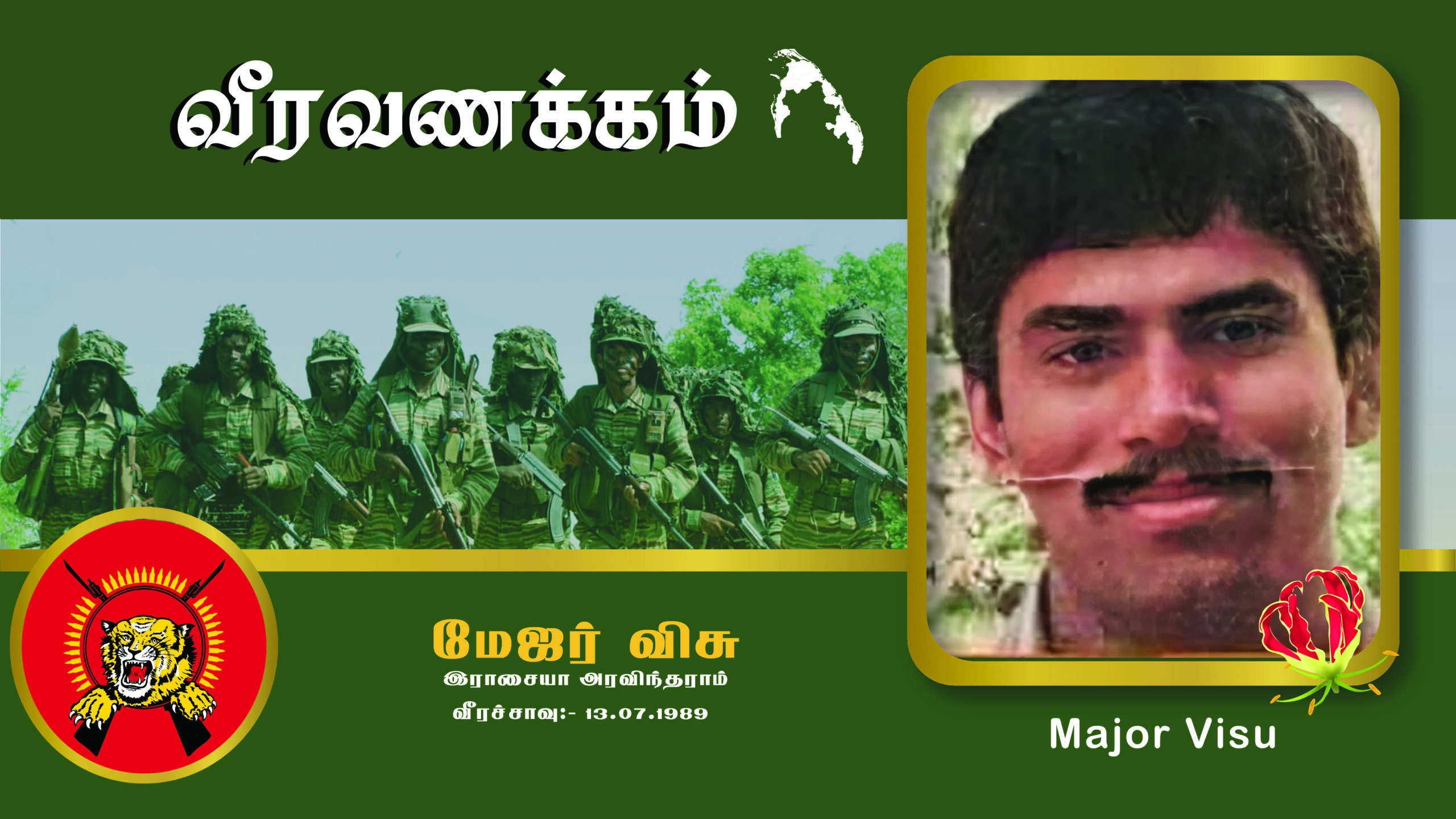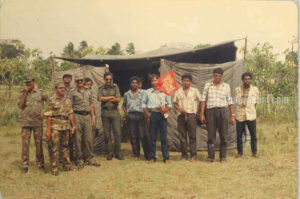

மேஜர் விசு அவர்களின் நினைவு நாள் இன்று 13.07.1989

புகை போகாத இடமெல்லாம் புலி போகும் என்ற புதுமொழியை நிரூபித்தவர் மேஜர் விசு.!
‘‘விசுவோட பழகினா அவனில் வெறுப்பு வைக்கமாட்டீங்கள். அந்தமாதிரித்தான் பழகுவான். பொதுவா, எல்லாரையும் எல்லோருக்கும் பிடிக்காது. ஆனால் விசு எல்லாருக்குமே பிடிச்சவனா நடந்து கொள்வான். ஒவ்வொரு விசையத்தையும் தெளிவா, ஆறுதலா எல்லோருக்கும் விளங்கக் கூடிய மாதிரிக் கதைக்கிற தன்மை அவனில் இருந்தது. அதனால்தான் இயக்கத்துக்கு புதிசா வந்த பெடியளெல்லாம் விசுவில அன்பாய் இருந்தாங்கள். இவன் அவையோட பழகிற முறை, போராட்டத்தைப் பற்றி விளங்கப்படுத்திற முறை வேறு ஆராலையும் மறக்கமுடியாது’’. இது வன்னிப் பகுதியில் விசுவின் காலப் பகுதியில் பணியாற்றிய ஒரு போராளியின் அனுபவங்கள்.
எப்போதும் சீராக உடையணிந்து, சிரித்த முகத்துடனே காணப்படும் இவனை எளிதில் எவரும் மறந்துவிட முடியாதுதான். இவன் இயக்கத்துடன் தொடர்பு கொண்ட காலத்தில், இரட்டை இலக்கத்தில் மட்டுமே அங்கத்தவர்கள் இருந்தனர். புலிகள் இயக்கம் சர்வதேச ரீதியாக பிரபலம் அடைந்திருந்தாலும், அங்கத்தவர் தொகை அந்தளவிலேயே இருந்தது. புலிகள் யாரென்பதை இனங்காண்பது கடினம். ஆனாலும், புலிகளைச் சந்திக்க வேண்டும் என்று விசுவும், அவனது நண்பனொருவனும் ஆவலாயிருந்தனர். ஏனெனில் அக்கால கட்டத்தில் புலிகள் இயக்கத்தின் பெயரால் மோசடிப் பேர்வழிகள் துண்டுப் பிரசுரம் விடுத்துக் கொண்டிருந்தனர். தாங்களே உண்மையான புலிகள் இயக்கம் என்ற மாயையை மக்கள் மத்தியில் திணிக்க முயன்று கொண்டிருந்தனர். தமது சகாவான சுந்தரத்தைப் பிரபாகரன் குழு கொன்றுவிட்டதாக ஓங்கி ஒலித்தனர்.
யார் உண்மையான புலிகள் எனத் தெரியாத நிலையில் விடுதலை விரும்பிகள் தத்தளித்தனர். ஒரு நாள் இயக்கத்தின் துணைத் தலைவராக விளங்கியவர் சைக்கிளில் துண்டுப் பிரசுரம் விநியோகித்தபடி வந்தார். ‘‘துரோகத்துக்குப் பரிசு’’ என்ற தலைப்பிலான அந்தத் துண்டுப் பிரசுரத்தில், சுந்தரம் மீது மரணதண்டனை விதிக்கப்பட்டமைக்கான காரணங்கள் தெளிவாக எடுத்துக் கூறப்படிருந்தன. கட்டுப்பாடான அமைப்பைக் கொண்ட இயக்கத்திலிருந்து இயக்கத்துக்குச் சொந்தமான துப்பாக்கியுடனும், பணத்துடனும் மறைந்தமை, இயக்கக் கட்டுப்பாட்டை மீறித் தனியொரு இயக்கம் ஆரம்பிக்க முற்பட்டமை ஆகிய காரணங்களுக்காக இத் தண்டனை வழங்கப்பட்டது என்று அதில் குறிப்பிடப்பட்டிருந்தது. புலி இலச்சினை பொறிக்கப்பட்ட அந்த துண்டுப் பிரசுரத்தை கண்டதும் உண்மையான புலிகளைக் கண்ட மகிழ்ச்சியில் திளைத்தனர் விசுவும், அவனுடைய நண்பனும் இயக்கத்துடன் தம்மை இணைத்துக் கொள்ளுமாறு வேண்டிக் கொண்டனர்.
அவ்வேளை, ‘‘உங்களது கோரிக்கை ஆராயப்படும்’’ எனப் பதில் கிடைத்தது.
அந்தக் காலத்தில் இருந்த வடிகட்டல் முறையில் இவர்கள் தேறினர். எனவே, இவர்கள் ஆதரவாளர்களாகச் செயற்பட அனுமதிக்கப்பட்டனர். தமிழீழ விடுதலைப் புலிகளால் மேற்கொள்ளப்பட்ட பொலிஸ் ஜீப் மீதான முதலாவது தாக்குதலுக்கு விசுவே தகவல், மற்றும் தங்குமிட ஏற்பாடுகளையும் கவனித்தான். எத்தனை மணிக்கு ஜீப் வருகிறது? என்னென்ன ஆயுதங்கள் வைத்திருக்கின்றனர்? எத்தனை பேர் வருகின்றார்கள்? எல்லாம் தினசரி குறிப்பெடுத்து வழங்கியதன் மூலம், அதற்கேற்ற வகையில் திட்டமிட்டு அத்தாக்குதல் வெற்றிகரமாக அமைவதற்கு உதவி செய்தான். அத்தாக்குதலில் நான்கு சிறிலங்காவின் பொலிஸ்காரர்கள் கொல்லப்பட்டனர். அவர்களிடமிருந்து ஆயுதங்கள் கைப்பற்றப்பட்டன.
காரைநகர் முகாமிலிருந்து புறப்பட்டுவரும் கடற்படையினருக்கு எதிரான தாக்குதலை மேற்கொள்வதற்காக பொன்னாலைப் பாலத்தில் மேற்கொள்ளப்பட்ட முயற்சி எதிர்பாராத விதத்தில் வெற்றியளிக்காது போகவே அங்கிருந்து வானில் தப்பிச் சென்ற போராளிகள் நேரே இவனிடந்தான் சென்றனர். இந்த மாதிரியான நேரங்களில் விசுவிடம் போவதே அனைவருக்கும் பாதுகாப்பு எனக் கருதினர் போராளிகள். எல்லோரையும் மறைத்து வைத்திருந்து, காப்பாற்றிப் பத்திரமாக அனுப்பி வைத்தான். போராட்டம் வளர்ச்சி பெறாத காலத்தில் இதெல்லாம் மதிப்பிட முடியாத பணிகள்தான். அடுத்த வீட்டுக்கே தெரியாமல் இவ்வளவும் செய்ய வேண்டும். விசுவால் அது முடிந்தது.
தொடர்ந்து 1983 ஆம் ஆண்டில் இவன் முழுநேர உறுப்பினராக இணைத்துக் கொள்ளப்பட்டான். இராணுவப் பயிற்சிக்காக கடல் கலந்து சென்ற அவன், பயிற்சி முடிந்ததும் அரசியல் வேலைகளுக்காகத் தேர்ந்தெடுக்கப்பட்டு, அரசியல் கற்கலானான். அது முடிந்ததும் தாய்நாட்டிற்கு மீண்டும் திரும்பிய இவன், வன்னி மண்ணில் எதிரிகள் மீது இலக்குப் பார்த்தான். எண்ணற்ற தாக்குதல்களை நடாத்தினான். அத் தாக்குதல்கள் இவனது தனித் திறமையைப் பறைசாற்றின. நாளடைவில் இவன் குழுத் தலைவனானான். யாழ் கண்டி வீதியில் 18ம் போர் எனுமிடத்தில் நிகழ்ந்த சிறீலங்கா இராணுவத் தொடரணி மீதான தாக்குதல், கிளிநொச்சி நகரைப் புலிகளின் கட்டுப்பாட்டினுள் கொண்டு வருவதற்காக மேற்கொள்ளப்பட்ட தாக்குதல்கள் என்பன ‘துணிச்சலுக்கு விசு’ என்ற பெயரைப் பெற்றுத் தந்தன. வன்னி மண்ணில் விசு போகாத இடமே இல்லை. அடுத்தடுத்த வீட்டுக்காரரின் பெயர்களைச் சொல்லக்கூடிய அளவிற்கு வன்னி மண்ணோடு இவன் பரிச்சயமானான். ஒரு தரம் இவன் ஒரு வீட்டிற்குச் சென்றால் போதும். அதன் பின் அந்த வீட்டிற்கு எந்தப் போராளி சென்றாலும் ‘‘விசு எப்படி இருக்கிறார்?, நாங்கள் விசாரித்தம் எண்டு சொல்லுங்கோ’’ எனுமளவிற்கு வன்னி மக்கள் மனதில் இடம் பிடித்துக் கொண்டான்.
1987 ஆம் ஆண்டு வடமராட்சியில் சிறிலங்காப் படையினர் மேற்கொண்ட ஒப்பேறேசன் லிபரேசன் நடவடிக்கையின் பின் நெல்லியடியில் உள்ள மகாவித்தியாலயத்தில் அமைந்திருந்த இராணுவ முகாம் மீது நடைபெற்ற முதற் கரும்புலித் தாக்குதலில் இவனது பங்கு மகத்தானது. இது இவனின் சொந்த இடமாகையால், மேலதிகப் பணிகளையும் மேற்கொள்ள வேண்டியிருந்தது. முகாமினுள் நுழைந்த முதற் குழுவினுள் ஒருத்தனாகவும் இருந்தான். இவனோடு கூடச் சென்ற கமலும், வின்சனும் மரணித்தனர். இவனது கண்ணிலும் ஏதோ ஒரு சிதறல் பறந்து வந்து தாக்கியது. இதனால் பார்வையில் பாதிப்பு ஏற்பட்டது. அதைத் தொடர்ந்து வைத்தியத்திற்காக இந்தியா சென்றான். இந்திய இராணுவத்துடனான மோதல் தொடங்கியதும், இவனுக்கு தான் ஒரு நோயாளி என்பதை விட, தான் ஒரு போராளி என்ற உணர்வே தலை தூக்கியது. பூரணமாகக் குணமாகாத கண்ணுடன் தமிழீழத்தை வந்தடைந்தான். இந்திய இராணுவத்துடனான மோதல்களில் இவன் ஈடுபட்டுக் கொண்டிருக்கையில், உளவுப் பிரிவின் பொறுப்பும் இவனிடம் ஒப்படைக்கப்பட்டது. ஒரு தேசிய விடுதலை இயக்கத்தின் வெற்றிக்குச் சரியான தலைமை, தியாக உணர்வு என்பவற்றுடன் தகவற் தொடர்பு, உளவு என்பனவும் முக்கியமானவையாகும். இந்த இரண்டிலும், அந்த விடுதலை இயக்கம் போதுமான வளர்ச்சியைப் பெற்றிருக்காவிடின், விடுதலை விரிவு படுத்தப்பட மாட்டாது. இப்படியான பொறுப்பு மிக்க பணிக்கு இவன் நியமிக்கப்படதிலிருந்து, இவன் மீது இயக்கத் தலைமை கொண்டிருந்த நம்பிக்கையை நாம் உணர்ந்து கொள்ளலாம்.
எங்கள் தேசிய இன விடுதலையைத் தமது சொந்த நலனுக்காக விற்ற துரோகிகளுக்கான தண்டனை வழங்கப்பட்டேயாக வேண்டும். துரோகிகளுக்கான தண்டனையை விரைவுபடுத்தாவிடில், தமிழீழ மண்ணில் மரணங்கள் தொடர்கதையாக இருக்கும். எனவே, ‘‘புகை போகாத இடமெல்லாம் புலி போகும்’’ என்ற புதுமொழியை நிரூபிக்கப் புறப்பட்டான் விசு.
 இப்பணியை மேற்கொள்ளும் போது, தான் திரும்பி வர முடியாது என இவனுக்கும், இவனது தோழர்களுக்கும் நன்றாகவே தெரியும். அப்படியிருந்தும் துரோகிகளைத் தேடிச் சென்றனர். அங்கே, ‘‘இத்தாலி இளைஞர்களை கரிபால்டி அழைத்தது போல, இங்குள்ள இளைஞர்களை நான் அழைக்கிறேன்’’ என்ற முழக்கமிட்ட அமிர்தலிங்கம், சிங்களச் சிப்பாய்களின் துப்பாக்கிகளில் நம்பிக்கை வைத்தபடி……..
இப்பணியை மேற்கொள்ளும் போது, தான் திரும்பி வர முடியாது என இவனுக்கும், இவனது தோழர்களுக்கும் நன்றாகவே தெரியும். அப்படியிருந்தும் துரோகிகளைத் தேடிச் சென்றனர். அங்கே, ‘‘இத்தாலி இளைஞர்களை கரிபால்டி அழைத்தது போல, இங்குள்ள இளைஞர்களை நான் அழைக்கிறேன்’’ என்ற முழக்கமிட்ட அமிர்தலிங்கம், சிங்களச் சிப்பாய்களின் துப்பாக்கிகளில் நம்பிக்கை வைத்தபடி……..
எந்தப் படையென்றாலும், எந்த நகரமென்றாலும், புலியின் கடமை ஒன்று நிறைவேற்றப்பட வேண்டுமாயின் அது நிறைவேறியே ஆகும் என விசுவினதும், தோழர்களினதும் துப்பாக்கிகள் உயர்ந்தன.
தனிநாடுக் கோரிக்கை தற்கொலைக்கு ஒப்பான செயல் என்று ஒரு காலத்தில் கூறியவருக்கு, தனிநாட்டுக்கான போராட்டத்தைக் காட்டிக் கொடுப்பது தற்கொலைக்கு ஒப்பானது; துரோகத்தனமானது என்று வரலாறு கூறிற்று.
‘துரோகத்திற்குப் பரிசு’ என்ற பிரசுரம் கையிற் கிடைத்ததன் மூலம், தமிழீழ விடுதலைப் புலிகளுடன் தொடர்பு கொண்ட விசு, துரோகத்திற்குப் பரிசு கொடுத்த பின், தன்னை இந்த மண்ணுக்கு கொடுத்துக் கொண்டான். கூடவே தோழர்கள் இருவரும் (கப்டன் அறிவு மற்றும் 2ம் லெப்டினன்ட் பீற்றர்).
-நன்றிகள்
விழுதுகள், ஈழநாதம் 1993